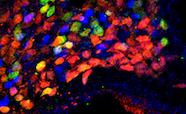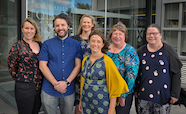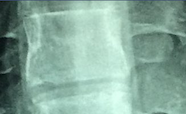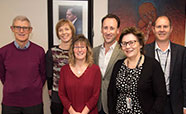Alphabetical listings of all the research groups and departments working in mental health that appear in this website.
Bioethics Centre
 Bioethics is the study of ethical issues arising within health care and the life sciences. The wide range of research projects and activities of the Bioethics Centre aims to examine the conventional and novel moral dilemmas arising from medical research, clinical settings, and advances brought about by life sciences and biotechnologies.
Bioethics is the study of ethical issues arising within health care and the life sciences. The wide range of research projects and activities of the Bioethics Centre aims to examine the conventional and novel moral dilemmas arising from medical research, clinical settings, and advances brought about by life sciences and biotechnologies.
Research theme: Philosophy, psychiatry, psychology, neuroscience, and mental (ill) health
How should mental health and ill-health be conceptualised, investigated, and treated? The picture today is complex, confusing and perhaps even contradictory. Today, people with various forms of mental health problems may find themselves consulting a psychiatrist, a clinical or a neuro-psychologist, a counsellor, or possibly a neurosurgeon—and perhaps more than one of these.
Email bioethics@otago.ac.nz
Web otago.ac.nz/bioethics/research/themes/otago070480.html
Centre for Neuroendocrinology
 We study how the brain controls hormones in the blood, and how these hormones can regulate the brain's activity. Our specialist expertise in fertility, reproduction, and body weight is at the forefront of global neuroendocrinology research. Formed in 2003, the Centre for Neuroendocrinology (CNE) presently comprises 10 collaborative research groups making it the largest cluster of neuroendocrinologists in the Southern Hemisphere.
We study how the brain controls hormones in the blood, and how these hormones can regulate the brain's activity. Our specialist expertise in fertility, reproduction, and body weight is at the forefront of global neuroendocrinology research. Formed in 2003, the Centre for Neuroendocrinology (CNE) presently comprises 10 collaborative research groups making it the largest cluster of neuroendocrinologists in the Southern Hemisphere.
Postpartum mood disorders
Dr Rosie Brown of the Grattan Laboratory, investigates postpartum mood disorders. She has just been awarded a $500,000 Hercus Health Fellowship by HRC. Dr Brown says the Fellowship will allow her to broaden her research to look at the role the hormone prolactin plays in the reward circuitry of the brain and its impact on how a mother cares for her infant after birth.
The research has important implications for understanding how the brain regulates mood and behaviour during pregnancy and in the early postpartum period. By understanding these pathways, Dr Brown hopes it could lead to the development of more effective diagnostic tools and strategies to treat those that suffer from postpartum mood disorders.
Email rosemary.brown@otago.ac.nz
Web otago.ac.nz/neuroendocrinology/research/dave-grattan.html
Christchurch Health and Development Study
 The Christchurch Health and Development Study (CHDS) has been in existence for over 40 years. During this time we have followed the health, education and life progress of a group of 1,265 children born in the Christchurch (New Zealand) urban region during mid-1977.
The Christchurch Health and Development Study (CHDS) has been in existence for over 40 years. During this time we have followed the health, education and life progress of a group of 1,265 children born in the Christchurch (New Zealand) urban region during mid-1977.
Current research objectives:
- Alcohol and cannabis use in the CHDS cohort
- Psychosocial and functional impairment resulting from mental disorders over the life course
- The long-term psychosocial impact of exposure to maltreatment in childhood
- The interplay between genes, environment and mental disorders
- The psychosocial consequences of a major disaster (the Canterbury Earthquakes) in the CHDS cohort
- Te Ao Māori perspective: the use of He Awa Whiria (a Braided Rivers model) to examine the CHDS data from both Western Science and kaupapa Māori perspectives
- The development of translational applications of research findings from the CHDS to contribute to policy development, implementation and evaluation
- The links between personality traits and adult psychosocial functioning
- The transitions to menopause for women aged 40
- Psychosocial factors associated with obesity
Risk factors
Professor John Horwood has research interests in psychosocial adjustment in young adolescence including consequences of drug use, the Canterbury earthquakes, and preterm birth.
Associate Professor Joseph Boden investigates the psychosocial causes and consequences of substance use, abuse, and dependence, mental health and substance use epidemiology, and the social and psychological determinants of maladaptive behaviour including aggression and violence.
Email chds.uoc@otago.ac.nz
Web otago.ac.nz/christchurch/research/healthdevelopment/research/
Department of Nursing
 The Department's research focus is on improving clinical outcomes for people with long-term, acute and complex conditions. Within this overarching focus our research involves interventions for the management of long-term conditions such as diabetes and bipolar disorders, women's health needs and for people with intellectual disability.
The Department's research focus is on improving clinical outcomes for people with long-term, acute and complex conditions. Within this overarching focus our research involves interventions for the management of long-term conditions such as diabetes and bipolar disorders, women's health needs and for people with intellectual disability.
Email sandra.scannell@otago.ac.nz
Web otago.ac.nz/christchurch/departments/nursing/research/
Department of Pharmacology and Toxicology
Cannabinoids toxicity
 Professor Michelle Glass' research focuses on the expression, function and molecular pharmacology of the cannabinoid receptors. Her recent research interests have extended to identifying the mechanism by which synthetic cannabinoids are resulting in high levels of toxicity in the community and advising on the development of clinical trials for medicinal cannabis products.
Professor Michelle Glass' research focuses on the expression, function and molecular pharmacology of the cannabinoid receptors. Her recent research interests have extended to identifying the mechanism by which synthetic cannabinoids are resulting in high levels of toxicity in the community and advising on the development of clinical trials for medicinal cannabis products.
Synthetic cannabis under spotlight for new Pharmacology head (Otago Bulletin)
Email pharmacology@otago.ac.nz
Web otago.ac.nz/phal/research/
Department of Preventive and Social Medicine
 We work to understand why some people are healthy and some are not, how to prevent illness and injury, how people's health can be improved through working with communities, how political systems and health organisations affect health, and other issues relating to the health of populations.
We work to understand why some people are healthy and some are not, how to prevent illness and injury, how people's health can be improved through working with communities, how political systems and health organisations affect health, and other issues relating to the health of populations.
Dr Shyamala Nada-Raja is a Senior Research Fellow and conducts research funded by HRC, MBIE, and the University of Otago on the:
- Determinants of mental health and well-being in youth, including high school and university students
Online Well-being Interventions - Epidemiology of self-harm / suicide / violence based on the Dunedin Study
- Rural mental health and well-being
- E-health interventions for mental health, well-being, and violence prevention
Harmonised app
Email shyamala.nada-raja@otago.ac.nz
Department of Psychological Medicine, University of Otago, Christchurch (UOC)
 The Department of Psychological Medicine in Christchurch has two major streams of research:
The Department of Psychological Medicine in Christchurch has two major streams of research:
Clinical Research
The Clinical Research Unit (Mental Health) has an established platform of research projects related to improving treatments and outcomes for those with serious mental health disorders.
Current research activities and thesis opportunities
Addiction and co-existing disorders
Professor Doug Sellman, Associate Professor Simon Adamson, Associate Professor James Foulds
Anxiety disorders and treatment
Professor Caroline Bell, Associate Professor Ben Beaglehole, Dr Jenny Jordan
Eating disorders
Professor Lois Surgenor, Dr Jenny Jordan
Family interventions in mood disorders
Dr Maree Inder
Improving functioning in mood disorders
Professor Marie Crowe, Professor Richard Porter, Research Associate Professor Katie Douglas, Dr Maree Inder
Neurocognitive interventions for mood disorders
Professor Richard Porter, Research Associate Professor Katie Douglas
Personality disorders and treatment
Professor Roger Mulder
Psychological adaptation to medical illness
Professor Lois Surgenor
Psychological consequences of disasters and trauma
Professor Caroline Bell, Associate Professor Ben Beaglehole, Professor Richard Porter
Psychotherapy for mood disorders
Professor Marie Crowe, Dr Jenny Jordan, Dr Maree Inder
The experience of and recovery from psychiatric disorders
Professor Marie Crowe
Current and on-going projects
A family intervention for mood disorders
Project funded by the Gamma Foundation.
Investigators: Maree Inder, Marie Crowe, Richard Porter
First-episode psychosis in Māori
Project grant funded by Rangahau Hauora Māori ( HRC ).
Investigators: Suzanne Pitama, Ruth Cunningham, James Stanley, Sue Crengle, Richard Porter, Marie Crowe
Inpatient Activation Therapy for Depression
Project grant funded by HRC .
Investigators: Richard Porter, Katie Douglas, Marie Crowe, Jenny Jordan
Intensive Rhythm Therapy for Treatment-resistant Bipolar Disorder
Feasibility grant funded by HRC .
Investigators: Richard Porter, Marie Crowe, Katie Douglas, Maree Inder
Māori and Bipolar Disorder
Project grant funded by Rangahau Hauora Māori ( HRC ).
Investigators: Suzanne Pitama, Ruth Cunningham, James Stanley, Jo Baxter, Sue Crengle, Roger Mulder, Richard Porter, Marie Crowe
Patients' experiences of the functional effects of mood disorders
Project funded by NZ Lotteries.
Investigators: Marie Crowe, Katie Douglas, Maree Inder, Hayley Wells
Psychotherapy and Cognitive Enhancement for Depressive Disorders
Hercus Fellowship funded by HRC .
Investigators: Katie Douglas, Richard Porter, Marie Crowe
Transdiagnostic group cognitive behavioural therapy for depression and anxiety in primary care
Feasibility grant funded by HRC .
Investigators: Caroline Bell, Richard Porter, Jenny Jordan
Translating Social Rhythm Therapy into Community Mental Health Services
Feasibility grant funded by HRC .
Investigators: Richard Porter, Marie Crowe, Maree Inder
Projects in development
- Psychological effects of the March 15 Mosque attacks
- Role of Cytokines in Bipolar Disorder
- Tele-Interpersonal and Social Rhythm Therapy for mood disorder
Health and Development Study
The Christchurch Health and Development Study ( CHDS ) has followed the health, education and life progress of a group of 1,265 children born in the Christchurch (New Zealand) urban region during mid 1977.
Contact Professor John Horwood or Associate Professor Joseph Boden for further information and study opportunities.
Email judith.stone@otago.ac.nz
Web otago.ac.nz/christchurch/departments/psychmed/research/
Department of Psychological Medicine, Dunedin School of Medicine (DSM)
Our collaborative research philosophy draws on the clinical and academic skills of the Department's psychiatrists and clinical and health psychologists with the overarching aim to improve mental health and the treatment of mental disorders, and to better understand how psychological factors influence physical health.
Our research projects are wide-ranging and fall within six main themes:
- Clinical psychiatry
- Health and medical psychology
- Mental disorders
- Psychopharmacology
- Sexual health and sexual harm
- Suicide prevention
Mental health epidemiology
Professor Kate Scott is a psychiatric epidemiologist and senior investigator in the World Health Organization's World Mental Health (WMH) Surveys Initiative, a coordinated series of household epidemiologic surveys of mental disorders in over 30 countries around the world. Her interests are in cross-national psychiatric epidemiology, the inter-relationship between mental and physical disorders, and gender differences in mental disorders.
Mental health disorders
Professor Paul Glue's research focuses on clinical and basic science. His areas of interest include the pharmacology of drug treatments in psychiatry and the investigation of disease mechanisms in neurological and psychiatric disorders.
Dr Chris Gale's research includes a focus on evidence based treatments for the common mental disorders.
Risk factors
Dr Sarah Fortune is an academic clinical psychologist with an enduring clinical and research interest in suicide prevention, and adolescent self-harm.
Dr Charlene Rapsey is a clinical psychologist who among her interests investigates childhood adversity as a risk factor for mental health.
Associate Professor Tess Patterson's research interests are in applied clinical and forensic psychology domains including childhood sexual abuse, harmful sexual behaviour and sexual offending, and alcohol and drug treatment outcomes.
Health and medical psychology
Associate Professor Nicola Swain investigates health psychology which focuses on how psychological and behavioural factors influence physical health, with the range of topics including chronic pain management, aggression and violence in healthcare, applications of mindfulness, and issues for carers.
Dr Maria Kleinstäuber is a Clinical and Health Psychologist with research interests in behavioural medicine interventions and medically unexplained symptoms.
Late-life psychiatric disorders
Associate Professor Yoram Barak is a Psychiatrist and Consultant Psychogeriatrician. Associate Professor Barak's research interests include multiple sclerosis, cancer, a wide range of psychiatric conditions (such as depression, schizophrenia, and obsessive–compulsive disorder), old-age psychiatry, and suicide.
Email psychological-medicine@otago.ac.nz
Web otago.ac.nz/dsm-psychmed/research/
Department of Psychological Medicine, University of Otago, Wellington (UOW)
 Our research programmes are configured around several themes relevant to mental health practice in the New Zealand setting:
Our research programmes are configured around several themes relevant to mental health practice in the New Zealand setting:
- Physical health of people with mental illness, including obesity and sleep
- Mental health service delivery and evaluation, including in primary care and secondary care
- The interface between psychological and physical health
- Social psychiatry and psychiatric epidemiology
- Suicide
- Service user-led and co-produced research and teaching (World of Difference project)
- Personality and its role in mental illness
- Education in the clinical professions
- Addictions
- Mental health law
- Stigma and discrimination
Addiction
Associate Professor Giles Newton-Howes is a general adult consultant psychiatrist with a sub-specialty in substance-misuse psychiatry. His research interests include the clinical understanding of personality disorders, particularly as they relate to psychiatric patients and mental-state disorder. He is also interested in the interface between psychiatry and society, particularly the application of coercive practices.
Service-user research
World of Difference is a new service-user research group focused on ending discrimination, and promoting recovery, inclusion, and respect for the human rights of people who experience mental distress, led and delivered by experts with personal experience. It is led by Associate Professor Sarah Gordon.
Email kristy.wilson@otago.ac.nz
Web otago.ac.nz/wellington/departments/psychologicalmedicine/research/
EleMent: Electronic data for mental health research
 EleMent are a multidisciplinary research group bringing together expertise in epidemiology, public health and data science with clinical and lived experience of mental distress. We use routinely collected electronic data from numerous sources alongside qualitative methods to understand the distribution, determinants and lived experience of mental distress in New Zealand. We have considerable experience in using linked electronic data for health research, including using the Statistics New Zealand Integrated Data Infrastructure (IDI).
EleMent are a multidisciplinary research group bringing together expertise in epidemiology, public health and data science with clinical and lived experience of mental distress. We use routinely collected electronic data from numerous sources alongside qualitative methods to understand the distribution, determinants and lived experience of mental distress in New Zealand. We have considerable experience in using linked electronic data for health research, including using the Statistics New Zealand Integrated Data Infrastructure (IDI).
Research Associate Professor Ruth Cunningham leads the research team and is a public health physician and epidemiologist. Her research areas include mental health and suicide epidemiology, the physical health of people with experience of mental distress and mental health service research with a focus on Māori.
Dr Debbie Peterson is a Senior Research Fellow whose research focuses on the issues affecting people with experience of mental distress, and whose lived experience informs her research practice. Her research areas include employment, recovery, suicide, discrimination, service provision and consumer involvement.
Public mental health current and recent research projects
Health and social outcomes for people with experience of mental distress
- Cancer survival disparities and severe mental illness
- Developing new cardiovascular risk prediction algorithms for people with mental illness
- Pathways to first episode psychosis for rangatahi Māori (in collaboration with MIHI)
Disparities in mental and other health service provision
- Projects examining mental health service provision for Māori, in collaboration with the Māori Indigenous Health Institute (MIHI) at the University of Otago Christchurch
- Mental health service provision for older New Zealanders
Mental health epidemiology and the social determinants of mental health
- We were commissioned by the Government Inquiry into Mental Health and Addiction to complete two large pieces of background work in 2018.
Mental Health Inquiry Commissioned Reports
Email ruth.cunningham@otago.ac.nz
Web otago.ac.nz/wellington/departments/publichealth/research/element/research/otago675769.html
General Practice Research Group, (UOC)
 Professor Dee Mangin leads the Christchurch General Practice Research Group which focuses on clinical research, where the results can be directly translated into clinical practice.
Professor Dee Mangin leads the Christchurch General Practice Research Group which focuses on clinical research, where the results can be directly translated into clinical practice.
The two central research themes underpinning this are rational use of medicines and innovative models of primary care.
Relevant research projects:
- Selective serotonin reuptake inhibitors (SSRI) study: Stable primary care depression: maintenance vs gradual withdrawal of fluoxetine
- Legacy drug prescribing patterns in primary care: Investigating the potential of legacy prescribing to contribute to unnecessary polypharmacy
Email generalpractice.uoc@otago.ac.nz
Web otago.ac.nz/christchurch/research/generalpractice/
Gene Structure and Function Laboratory
 Professor Martin Kennedy is director of the Gene Structure and Function Laboratory. They are interested in the application of genetics to the understanding and treatment of disease. Their main research themes are pharmacogenomics, psychiatric genetics, and the genetics of complex disease.
Professor Martin Kennedy is director of the Gene Structure and Function Laboratory. They are interested in the application of genetics to the understanding and treatment of disease. Their main research themes are pharmacogenomics, psychiatric genetics, and the genetics of complex disease.
The Gene by environment interactions in health and development programme explores gene by environment interactions, epigenetic and epigenomic studies, and analysis of genetic factors underlying personality and mental health, in the context of international research consortia including the Psychiatric Genomics Consortium.
The Anorexia Nervosa Genetics New Zealand study seeks to understand genetic factors that predispose to the eating disorder Anorexia nervosa.
Email martin.kennedy@otago.ac.nz
Web otago.ac.nz/gene-structure/research
Injury Prevention Research Unit
 Injury Prevention Research Unit (IPRU) undertakes research that contributes to reducing the incidence, severity and adverse consequences of injury in New Zealand. IPRU's staff work in a wide range of research areas: unintentional injury, outcomes of injury, and injury prevention.
Injury Prevention Research Unit (IPRU) undertakes research that contributes to reducing the incidence, severity and adverse consequences of injury in New Zealand. IPRU's staff work in a wide range of research areas: unintentional injury, outcomes of injury, and injury prevention.
Alcohol misuse
Professor Jennie Connor is a public health physician and epidemiologist, who teaches epidemiology. She has 20 years of experience in public health research that has largely focused on injury prevention, sexual and reproductive health, and the health impacts of alcohol. Current research collaborations include evaluation of New Zealand's alcohol legislation and quantifying alcohol's harm to others.
Professor Kyp Kypri's area of interest is alcohol-related injury. He is an investigator on the HRC-funded Evaluation of New Zealand's Alcohol Laws (ENZALs) led by Dr Brett Maclennan, and is leading a study of suppression clauses used in government research contracts. He contributes to a number of projects conducted by the Alcohol Research Group Otago, led by Professor Jennie Connor.
Email iprunz@otago.ac.nz
Web https://blogs.otago.ac.nz/ipru/research
Kōhatu–Centre for Hauora Māori
Kōhatu provides the focus for hauora Māori (Māori health) within the Dunedin School of Medicine and involves teaching, research, Māori strategic development (including workforce and professional development), community networking, and student relationships and support.
Email tui.kent@otago.ac.nz
Web otago.ac.nz/dsm-dean/student-support/hauora-maori
Māori Indigenous Health Innovation (MIHI)
 Māori Indigenous Health Innovation (MIHI) undertakes and supports research that explores Māori health inequities and building excellence in research evidence that contributes to Māori health advancement.
Māori Indigenous Health Innovation (MIHI) undertakes and supports research that explores Māori health inequities and building excellence in research evidence that contributes to Māori health advancement.
Māori mental health is a priority area within Māori health. Professor Suzanne Pitama has a clinical background in this field, which supports a desire to contribute to this area of research.
Other MIHI research interests include:
- Stress cardiomyopathy and earthquakes
- Epilepsy and depression
- Broad mental health kaupapa
- Broader Māori Health kaupapa
Email mihi.uoc@otago.ac.nz
Web otago.ac.nz/christchurch/research/mihi/
National Addiction Centre
 The National Addiction Centre (NAC) is active in teaching, research, and sector leadership activities.
The National Addiction Centre (NAC) is active in teaching, research, and sector leadership activities.
NAC research activities have included projects covering a wide range of substance addictions as well as compulsive overeating and problem gambling, and the presence of co-existing mental health problems. Research projects often involve students completing Master's or Doctoral degrees.
NAC academic staff play an active role in the wider addiction and mental health sectors contributing to a range of organizations and initiatives.
Email lisa.andrews@otago.ac.nz
Web otago.ac.nz/christchurch/research/nac/research/
Ngāi Tahu Māori Health Research Unit – Te Roopū Rakahau Hauora Māori o Kāi Tahu
 The Ngāi Tahu Māori Health Research Unit (NTMHRU) contributes to a wide range of Māori health research projects and initiatives within the Department of Preventive and Social Medicine, the University of Otago, and our communities to ensure important and beneficial outcomes for Māori.
The Ngāi Tahu Māori Health Research Unit (NTMHRU) contributes to a wide range of Māori health research projects and initiatives within the Department of Preventive and Social Medicine, the University of Otago, and our communities to ensure important and beneficial outcomes for Māori.
Our people – Ko tātou
Research in mental health:
Scoping Rangatahi Primary Mental Health – A kaupapa Māori approach to identifying the gaps and need
Associate Professor Sue Crengle, and Ms Vicky Nelson are aiming to improve primary mental health care for rangatahi by exploring:
- What rangatahi mental health needs and gaps are within community and primary mental healthcare contexts
- Primary mental health pathways and strategies that would address this need; being more responsive and effective for rangatahi Māori and their whānau
This project is underpinned by kaupapa Māori principles and theory and is supported by:
- Professor Emma Wyeth (NTMHRU)
- Associate Professor Leonie Pihama, Director of Te Kotahi Research Institute
- Dr Terryann Clarke, senior lecturer University of Auckland and Manaia Health PHO Child and Youth Friendly Cities Co-ordinator
More about this project:
Vicky Nelson presented her research at the In-house Convention
The Psychological and Physical Health and Wellbeing of New Zealand Contemporary Veterans
Professor Emma Wyeth is a Named Investigator on this project led by Professor David McBride. The project aims to describe the risk and protective factors for health and well-being of New Zealand veterans, including specifically for Māori veterans, who have served during and since the Persian Gulf War. This study will help to determine the prevalence of post-traumatic stress disorder (PTSD) and Multiple Symptom Illness (MSI) for this group.
Email ntmhru@otago.ac.nz
Web otago.ac.nz/maori-health-research/research/index.html
School of Pharmacy
 The School of Pharmacy is committed to caring for our communities through:
The School of Pharmacy is committed to caring for our communities through:
- Excellence in education and development of the pharmacy workforce
- Excellence in research into pharmaceuticals and healthcare
- Translating our research into practical knowledge and products that improve the health of our communities
Clinical pharmacy is the area of pharmacy concerned with patient care and the optimisation of medicine use in order to promote health and wellness, and prevent disease.
Predicting response to drug treatments
Professor Bruce Russell investigates biomarkers that enable the prediction of a response to treatment for severe mental health disorders. His research focuses on investigating the psychopharmacology and underlying pathophysiology of the severe mental illnesses such as schizophrenia with an emphasis on treatment-resistance. He aims to discover biomarkers that will enable the prediction of an individual's response to drug treatment. He also has an active interest in the psychopharmacology of both new and old recreationally-used drugs and the mechanisms underlying drug addiction.
Email pharmacy@otago.ac.nz
Web www.otago.ac.nz/pharmacy/research/clinical-pharmacy
Suicide and Mental Health Research Group – Te Rōpū Rangahau i te Mate Whakamomori me te Hauora Hinengaro
The Suicide and Mental Health Research Group is a multi-disciplinary team of researchers and clinicians. It contributes to knowledge, policy, and services by conducting high quality research in suicide prevention, mental health and illness.
Research students are important contributors to the research group and we currently support a number of PhD students. In the last five years publications from the group have focused on suicide and self-harm, and management of mental health care in primary care.
Research Associate Professor Gabrielle Jenkin's training is in public health and social science methods. She supervises a number of PhD students in suicide research and mental health services research. She is currently the PI of a multidisciplinary Marsden funded research project to investigate the design, philosophy and social regime of adult acute mental health wards in New Zealand.
Dr Sarah McKenzie received a Marsden Faststart grant to investigate men's mental health using visual methods. This multidisciplinary study will provide the first in-depth gender analysis of how dominant ideas about 'how to be a man' in New Zealand society impact on young men's mental health, leaving some at far greater risk of taking their own lives.
Email sarah.mckenzie@otago.ac.nz
Web otago.ac.nz/wellington/research/smhrg/research
Te Rōpū Rangahau Hauora A Eru Pōmare – Eru Pōmare Māori Health Research Centre
 Te Rōpū Rangahau Hauora a Eru Pōmare strives to create a Kaupapa Māori space committed to improving Māori health outcomes and eliminating inequalities through quality science and ongoing theoretical development. It takes a rights-based approach consistent with the Treaty of Waitangi, and is engaged with community through a spectrum of influence from community development, policy advocacy, research dissemination and Māori health research workforce development.
Te Rōpū Rangahau Hauora a Eru Pōmare strives to create a Kaupapa Māori space committed to improving Māori health outcomes and eliminating inequalities through quality science and ongoing theoretical development. It takes a rights-based approach consistent with the Treaty of Waitangi, and is engaged with community through a spectrum of influence from community development, policy advocacy, research dissemination and Māori health research workforce development.
Email bridget.robson@otago.ac.nz
Web otago.ac.nz/wellington/departments/publichealth/research/erupomare/research/
Va'a o Tautai – Centre for Pacific Health
The Va'a o Tautai – Centre for Pacific Health, based within the Division of Health Sciences, hosts several projects related to mental health and well-being among Pacific communities.
Ola Malohi Research Group: Mental health and well-being of Pacific youth in higher education
 Faumuina Associate Professor Fa'afetai Sopoaga, has been awarded an HRC grant for three years to investigate.
Faumuina Associate Professor Fa'afetai Sopoaga, has been awarded an HRC grant for three years to investigate.
There are at least 30,000 Pacific students in tertiary institutions. This research seeks to support and enhance the mental health and well-being of Pacific students in tertiary institutions. We are seeking to determine the protective and resiliency factors, as well as other factors which impact on the health and mental well-being of Pacific students. We will explore students access to services, their experiences and expectations including barriers to using health or other support services. Furthermore, we wish to determine the role of access to services on their mental health, well-being and academic progress.
Email ola.malohi@otago.ac.nz
Web otago.ac.nz/healthsciences/research/ola-malohi.html
Sleep and well-being among Pacific children and adolescents
Professor Rose Richards has a HRC Pacific Project Grant to investigate sleep and well-being.
 Ensuring children and adolescents receive sufficient good-quality sleep is critical for their physical and emotional health. We currently know little about sleep in Pacific children and their families and how to best support good sleep / wake patterns within Pacific contexts. The overarching objective of this project is to inform the development of effective sleep interventions by capturing Pacific perspectives about sleep, health and interventions.
Ensuring children and adolescents receive sufficient good-quality sleep is critical for their physical and emotional health. We currently know little about sleep in Pacific children and their families and how to best support good sleep / wake patterns within Pacific contexts. The overarching objective of this project is to inform the development of effective sleep interventions by capturing Pacific perspectives about sleep, health and interventions.
The first study will involve interviews with Pacific parents, exploring intergenerational changes in sleep patterns, associations between sleep and well-being and appropriateness of current sleep measurement and intervention strategies. A second study will use key informant interviews with Pacific health and educational professionals to explore the role of sleep in health / education outcomes for Pacific families and explore ways to maximise the effectiveness of sleep interventions for Pacific communities.
Email rose.richards@otago.ac.nz
Web otago.ac.nz/healthsciences/pacific/vaa-o-tautai.html
What happens to Pacific Island youth with mental health conditions: Evidence from the New Zealand Integrated Data Infrastructure
Lesieli Prescott, a Master's in Health Sciences candidate, is investigating.
In New Zealand there is currently an over representation of Pacific youth suffering from mental health conditions (MHCs). Despite this, little is known about the possible determinants leading to these conditions and furthermore, their association to other health outcomes. Using data extracted from the Integrated Data Infrastructure (IDI), this quantitative study retrospectively researched young Pacific people aged 10-14 years old who had been diagnosed with attention deficit hyperactive disorder (ADHD), mood disorder, anxiety, conduct disorder or substance disorder.
The aims of this research were to describe the diagnosis of these specified MHCs among Pacific youth in New Zealand; To explore the likelihood of deprivation and migration as determinants for the onset of these MHCs; And to examine whether there was an increased risk between the onset of these MHCs and the development of short-term health outcomes, measured by the occurrence of ambulatory sensitive hospitalisation (ASH) conditions.
Email rose.richards@otago.ac.nz
Web otago.ac.nz/healthsciences/pacific/vaa-o-tautai.html